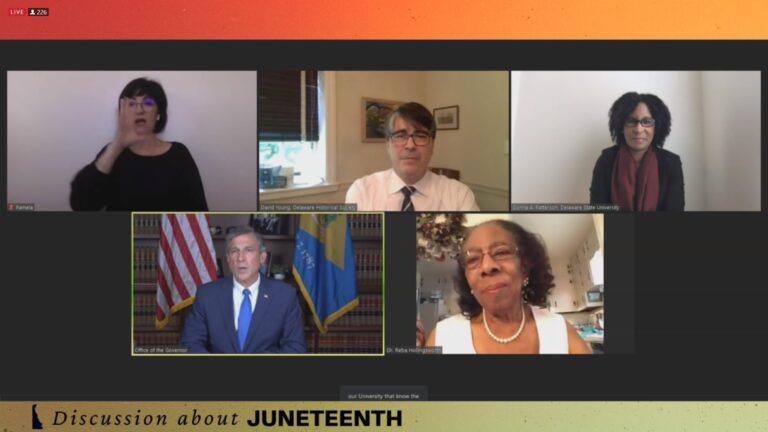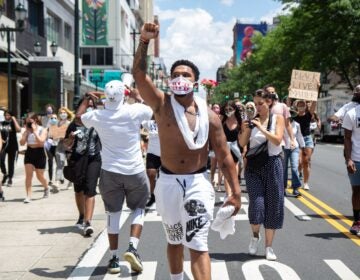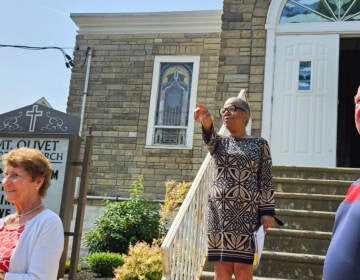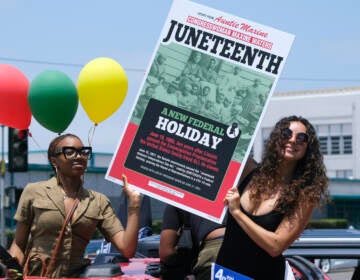Juneteenth did not mean freedom for Delaware slaves
Juneteenth celebrations mark word of the end of slavery arriving in Texas on June 19, 1865, but people enslaved in Delaware were still not freed until months later.

Gov. John Carney hosted an online conversation about Juneteenth with some of the state's black history leaders. (Mark Eichmann/WHYY)
As Juneteenth’s observance is getting more attention and being adopted more widely as an official holiday, there’s growing attention to how people were held in slavery in Delaware even after the date commemorated as Juneteenth.
The holiday celebrates June 19, 1865 when federal troops arrived in Galveston, Texas bringing word that the Civil War had ended and any enslaved people were now freed via President Lincoln’s Emancipation Proclamation.
But because Delaware was a border state between the North and South, Lincoln’s order did not apply to slaves in the First State. The last complete census in 1860 found 1,900 people living in slavery in Delaware. Most of those were in southern Delaware’s rural Sussex County, although smaller numbers were held throughout the state. Those still held in slavery on June 19 would not be freed until December of 1865 when the 13th Amendment was ratified.
Delaware prides itself on being “The First State” for ratifying the Constitution before any other, but it was among the last to ratify the 13th Amendment outlawing slavery, waiting until February 1901, more than 35 years after the end of the Civil War.
“If we don’t educate ourselves and acknowledge the ugly history around race, we can’t begin to understand the anger and frustration that we’ve seen,” said Gov. John Carney Friday. He hosted an online forum on Juneteenth with Black leaders including Dr. Reba Hollingsworth, Vice Chair of the Delaware Heritage Commission, historian Sylvester Woolford, and Dr. Donna Patterson, Chair of the Department of History, Political Science, and Philosophy at Delaware State University.
Even though slavery still persisted in Delaware and elsewhere, Woolford said Juneteenth has rightly been established as the observation of slavery’s end. “We as a nation should have a celebration of an end to this terrible period in history,” he said. “Juneteenth has taken on its own definition, or its own life and it is being celebrated.”
Carney declared this Juneteenth a state holiday and this is the first year state offices were closed in observance. A number of municipalities and both Delaware State University and the University of Delaware have closed for the day. But as Juneteenth gets more attention than ever this year, amid calls for a national Juneteenth holiday, some wonder what effect that would have on the meaning of the day.
Dr. Patterson grew up in Texas, where Juneteenth has been a holiday since 1980. “I’ve been really gratified to see this response to Juneteenth, a lot of us thought this was our personal holiday,” she said. “I am torn to some degree, because I would love to see a lot of states make it a state holiday officially, and perhaps finally a national federal holiday, but then what does that look like? Will that change the essence of Juneteenth?” She said other holidays have become more commercialized and lost their original meaning.
“I believe that the least we can do is to commit to learning the lessons of our history, to actually learn, to understand our history, to learn from that, and to move forward, and that’s both the good and the bad,” Carney said.
Because Delaware stayed in the Union during the Civil War, the state was not required to report incidents of racial violence such as lynchings after the war like southern states were. That has led to an incomplete record of violence Black people faced in Delaware.
Late last year, the Delaware Historical Society’s Stephanie Lampkin launched a project to uncover some of that history. In cooperation with researchers at the University of Delaware and Delaware State University, the Unequal Justice in Delaware Project will document stories of racial violence against blacks in the years following the Civil War.
“We definitely think there were more incidents of racial violence … lynchings specifically, and that’s what we’re working on,” said Amy Shepherd with the Delaware Social Justice Remembrance Coalition.
Shepherd’s daughter, Savannah, was the driving force behind memorializing one of those incidents: the lynching of George White, who was killed by an angry mob after being tortured and burned in June 1903. The incident happened a few miles west of Wilmington while White, who was Black, was awaiting trial after being accused of murdering a white girl a few days earlier.
But just weeks after that memorial was dedicated, someone stole the marker.
The marker was replaced in October. No one was ever charged in connection to the theft.
Last week, Wilmington removed the iconic Caesar Rodney statue from downtown Wilmington’s Rodney Square. The statue depicts Rodney’s ride to Philadelphia to cast the deciding vote for the Declaration of Independence. Images of Rodney are scattered throughout Delaware from the logo of Delaware Blue Coats basketball team, the 76ers minor league team, to the Caesar Rodney School District in Dover. But Rodney’s history as a slave holder has largely been overlooked. Wilmington Mayor Mike Purzycki said the city would start a conversation about Rodney’s legacy before deciding if the statue would be replaced.
“Statues may go away, but statues aren’t history. They’re expressions of the values of a community at a select point in time,” said David Young, director of the Delaware Historical Society. “Our values change the more we understand history, and therefore, we can see an evolving sense of history and rewrite it, hopefully together.”
He envisions the two weeks between Juneteenth and the Fourth of July as a fortnight celebration of freedom, recognizing the steps and missteps America has taken in an effort to fulfill the promise of the Declaration of Independence that “all men are created equal.”

Show your support for local public media
WHYY is your source for fact-based, in-depth journalism and information. As a nonprofit organization, we rely on financial support from readers like you. Please give today.






